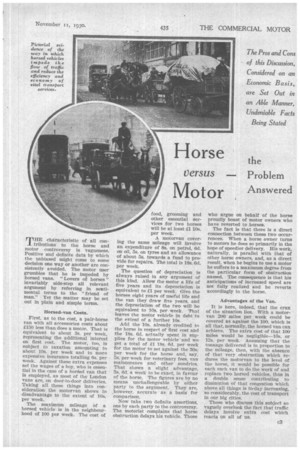Horse the Versus Problem Motor Answered
Page 69

If you've noticed an error in this article please click here to report it so we can fix it.
MHE characteristic of all con tributions to the horse and motor controversy is vagueness. Positive and definite data by which the unbiased might come to some decision one way or another are consistently avoided. The motor user grumbles that he is impeded by horsed vans. " Lovers of horses" invariably side-step all relevant argument by referring in sentimental terms to the "friend of man." Yet the matter may be set out in plain and simple terms.
Horsed-van Costs.
First, as to the cost, a pair-horse van with all accessories costs about £150 less than does a motor. That is equivalent to about 3s. per week, representing the additional interest on first cost. The motor, too, is subject to taxation amounting to about 10s. per week and to more expensive insurance totalling Os. per week. Against these extra expenses set the wages of a boy, who is essential in the case of a hotted van that is employed, as most of the London vans are, on door-to-door deliveries. Taking all these things into consideration the motorvan shows to disadvantage to the extent of 10s. per week.
The maximum mileage of a horsed vehicle is in the neighbourhood of 100 per week. The cost of food, grooming and other essential services for two horses will be at least A. 10s. per week.
A motorvan covering the same mileage Will involve an expenditure of 8s. on petrol, 6d. on oil, 5s. on tyres and an allowance of about 5s. towards a fund to provide for repairs. The total is 18s. 6d. per week.
The question of depreciation is always raised in any argument of this kind. Allow the motor a life of five years and its depreciation is equivalent to fl per week. Give the horses eight years of useful life and the van they draw five years, and the depreciation of the two will be equivalent to 10s. per week. That leaves the motor vehicle in debt to the extent of a further 10s.
Add the 10s. already credited to the horse in respect of first cost and the 18s. 6d. actually spent in supplies for the motor vehicle and we get a total of £1 18s. 6d. per week for the motor to set against the 30s. per week for the horse and, say, 55. per week for veterinary fees, van maintenance and other sundries. That shows a slight advantage, 3s. 6d. a week to be exact, in favour of the horse. The figures are by no means unchallengeable by either party to the argument. They are, however, accurate as a basis for comparison.
Now take two definite assertions, one by each party to the controversy. The motorist complains that horse obstruction delays his vehicle. Those who argue on behalf of the horse proudly boast of motor owners who have reverted to horses.
The fact is that them is a direct connection between these two occurrences. When a horse owner turns to motors he does so primarily in the hope of speedier delivery. His work, naturally, is parallel with that of other horse owners, and, as a direct result, when he begins to use a motor he suffers to a maximum degree from the particular form of obstruction named. The consequence is that his anticipations of increased speed are not fully realized and he reverts accordingly to the horse.
Advantages of the Van.
It is here, indeed, that the crux of the situation lies. With a motorvan 200 miles per week could be covered as against the 100, which is all that, normally, the horsed van can achieve. The extra cost of that 100 miles would be negligible-10s. or 12s. per week. Assuming that the tonnage delivered is in proportion to the mileage, then, with the absence of that very obstruction which reduces the motorvan to the level of the horse, it would be possible for each such van to do the work of and replace two horsed vehicles, thus in a double sense contributing to diminution of that congestion which above all things is to-day increasing, so considerably, the cost of transport in our big cities.
Those who discuss this subject so vaguely overlook the fact that traffic delays involve extra cost which reacts on all of us.




















































































































































